I was recently reviewing a couple of web sites Purely Prabhupada.com and Purely Prabhupada.org. Both nice informative sites.
When I clicked on the About Srila Prabhupada link, the following essay appeared, we share it with you here today.
About Śrīla Prabhupāda
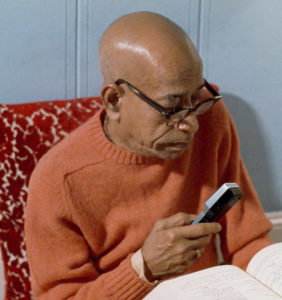
His Divine Grace A.C. Bhaktivedanta Swami Prabhupāda
It is very difficult to write about His Divine Grace A.C. Bhaktivedanta Swami Prabhupāda for several reasons. First is the challenge how to properly honor and represent such a personality who exhibited unprecedented greatness by his humility and dedication to the order of his spiritual predecessor. Second, how to condense into a short historical and introductory narrative his mission, his mood, his struggles, and his kindness and endearing humanness. And last, how to present his mission and the organization he formed to perpetuate it while recognizing that it has deviated from his mood and standards since the time of his passing. This last challenge is the most difficult for our hearts to face, having ourselves dedicated many years of hard work to building and supporting the organization, and having those efforts discounted, minimized, and in fact, betrayed by later management. We have observed persons who would have otherwise studied Śrīla Prabhupāda’s books been too affected by the misdeeds of the organization to enter into the wisdom upon which it had been founded, not being able to separate the pure spiritual essence from the superficial structure. We have also suffered the embarrassment of being “lumped in” with something that has become a mere shadow of the original intent and purity. We are bound out of our love for Śrīla Prabhupāda to keep his teachings alive and to create community in which those who are sincere in their spiritual quest may find support and solace in a kind and genuine way if they desire. That all being said, here is our humble effort to introduce to you our spiritual preceptor.
His Divine Grace A.C. Bhaktivedanta Swami Prabhupāda, known to his followers as “Śrīla Prabhupāda,” was born in Calcutta, India, September 1, 1896. His mother was Rajani Devi, and his father was Gour Mohan De. The child was given the name Abhay Caran by his father, which means “one who is fearless, having taken shelter at the lotus feet of the Lord.” It was prophesied by a qualified astrologer of the day that this personality would eventually cross the ocean and open 108 temples in honor of the Supreme Personality of Godhead. Śrīla Prabhupāda was born with a mission, and every step of his life was in preparation to fulfill it.
Gour Mohan De’s only desire for his son was that he became a pure devotee of the Supreme Lord. To become a pure devotee does not constitute any particular religion or faith. It is the innate quality of the soul, to be united with God according to the unique relationship that naturally exists between the Lord and His parts and parcels, but that is covered when the soul is contained in the world of matter. The Vedic culture of India was meant to assist the soul in coming to that place of reconnection with God, and Abhay was born into that culture, to parents who had no agenda other than to see their son successful in attaining the topmost goal of life. Abhay’s father continuously offered prayers to Śrīmatī Rādhārāṇī, the eternal feminine counterpart of the Supreme, who is compassion personified, that his son would be Her eternal servant.
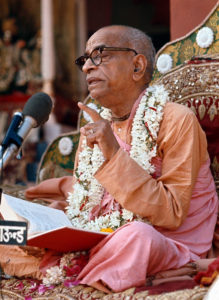
The De family had a temple in their home, and the young Abhay Caran spent many hours gazing at the beautiful forms of Kṛṣṇa upon the altar. He imitated the daily worship of a neighboring temple with flowers and incense, as he cared for the small deity forms of Rādhā and Kṛṣṇa that his father had given him. He naturally developed an affinity for the worship of the Lord. Gour Mohan also arranged for mṛdaṅga drum lessons for him early on, so that his son would develop a taste for engaging in singing the Holy Names of God. Śrīla Prabhupāda thus became expert in the art of devotional music, and years later would teach the art to his young disciples, who were always amazed and inspired by the beauty of his chanting and playing traditional instruments in accompaniment.
The De family took part in the many traditional Indian festivals glorifying the Lord. A festival very dear to Śrīla Prabhupāda’s heart was the Ratha Yātrā parade, in which the forms of Lord Jagannātha, Lord Balarāma, and Lady Subhadrā are pulled on grand carts through the city streets in order to be seen by, and offer blessings to, the thousands of witnesses and participants who are so fortunate to attend. As a child of only six years, Śrīla Prabhupāda engaged his whole neighborhood in creating a miniature Ratha Yātrā parade. It was initially intended as a festival for the children, but the whole neighborhood, even the adults who attended, experienced great transcendental pleasure. Many years later, Śrīla Prabhupāda would initiate the performance of this ancient festival in every major city of the world.
Abhay was only 14 years of age when his loving mother, Rajani Devi, left this world.
Gour Mohan De had no desire for his son to follow the fashion of the day and go to England for study, knowing how easily in a materialistic climate the devotional path could become obscured. Abhay Caran De was thus educated in the British run Scottish Churches College in Calcutta. He was married in 1918, while still a student, to Rādhārānī Devi, and they eventually had five children, the first of which, a son, was born in 1921. He joined Gandhi’s Non-Cooperation Movement also in that same year, and although he had met all the requirements for his college graduation, chose to reject his duly earned diploma because of his dedication to Gandhi’s stance. In that same year, his father arranged for a close friend, Dr. Bose, to hire him in his growing laboratory and pharmaceutical business. He was thus appointed as the Assistant Manager of Dr. Bose’s Laboratory in Calcutta.
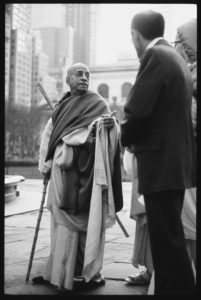
In 1922, during the time Śrīla Prabhupāda was employed at the laboratory, his close childhood friend, Sri Narendranātha Mullik, strongly urged him to come and meet a certain person named Bhaktisiddhānta Sarasvatī Maharāja. In his youth, Śrīla Prabhupāda’s father often invited renunciates to their home for meals and discourse, as was the custom of pious families. As a child, he could remember not being very impressed with many of these visitors, but nevertheless, he reluctantly accompanied his friend.
Śrīla Bhaktisiddhānta Sarasvatī Goswami, however, was the leading preceptor of Kṛṣṇa Consciousness in India in the early 20th century, and upon hearing from him, Abhay’s heart became changed. Even at that first meeting, his future spiritual master expressed his desire for the young Abhay Caran De to preach the message of Lord Caitanya in English, for the benefit of the ignorant, suffering masses of the Western world. At that meeting, Śrīla Prabhupāda argued with him that as long as India was ruled by the British, who would have respect and hear? Śrīla Bhaktisiddānta countered that political leaders come and go, but the needs of the soul must take precedent above all else. Being from Bengal, Śrīla Prabhupāda had grown up with the teachings of Śrī Caitanya and felt convinced the mission was now in capable hands, and this preacher was truly a saintly person. He was exhilarated to have been defeated by him. In that moment, he internally accepted Śrīla Bhaktisiddhānta as his spiritual master, although, due to circumstances, it would be eleven years before he took formal initiation.
Śrīla Prabhupāda soon left Calcutta for Allahabad to open the Prayag pharmacy. Members of Śrīla Bhaktisiddhānta’s Gaudiya Matha preaching mission visited the pharmacy, hearing he was a pious man, and were grateful to receive his assistance in establishing a new branch locally. This gave Śrīla Prabhupāda regular opportunity to associate with the followers of Śrīla Bhaktisiddhānta Sarasvatī, and eventually take part in the many programs organized by the mission.
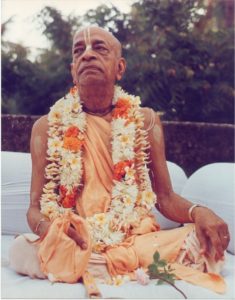
In 1930, Śrīla Prabhupāda’s father left this world to return to the eternal abode of his beloved Lord. Although Gour Mohan De had been a cloth merchant by trade, Śrīla Prabhupāda said his father’s real business was his service to God. He had many fond childhood memories of watching his father each day, coming home early to bathe and begin devotional activities in their temple room. Gour Mohan cleansed the altar, offered arotik with incense, flowers, ghee lamps and other items used in daily worship. He had trained young Abhay in the topmost standards of cleanliness and devotion. Impure habits, such as meat eating, intoxication of any sort, and even going to the cinema, were unknown in that household. Śrīla Prabhupāda maintained these standards throughout his life, even when there was pressure from so-called swamis and yogis in the west to become more “socially acceptable.” Śrīla Prabhupāda, in deep gratitude to his father for his devotional upbringing, later on dedicated his book “Kṛṣṇa, the Supreme Personality of Godhead” to him.
“To My Father, Gour Mohan De (1849-1930)
A pure devotee of Kṛṣṇa, who raised me as a Kṛṣṇa Conscious child from the beginning of my life. In my boyhood ages he instructed me how to play the mṛdaṅga. He gave me Rādhā- Kṛṣṇa Vigraha to worship, and he gave me Jagannātha-Ratha to duly observe the festival as my childhood play. He was kind to me, and I imbibed from him the ideas later on solidified by my spiritual master, the eternal father.”
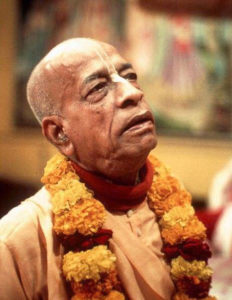
Śrīla Prabhupāda continued to be eager to hear from Śrīla Bhaktisiddhānta Sarasvatī, although his business and family obligations only allowed that chance a few times in his whole life. He took full advantage of whatever opportunity he had to hear from his spiritual master, even when he could not always completely understand the erudite teachings of this saintly scholar. It was this eagerness which prompted Śrīla Bhaktisiddhānta to accept him as a formally initiated disciple in 1933, in Allahabad, saying, “Yes, he is eager to hear, I have marked him.”
Śrīla Bhaktisiddhanta confided in Śrīla Prabhupāda intimate matters, things not even spoken to his renounced disciples. He expressed to Śrīla Prabhupāda his concerns over the petty infighting of his followers over mundane acquisitions. In one walk together by the banks of the sacred Radha-kunda in Vrndaban, Śrīla Bhaktisidddhānta Sarasvatī told him that if he ever got money he should print books, and if he himself could sell the marble stone of the newly acquired Gaudiya Matha buildings in order to print transcendental literatures, he would do so. Śrīla Prabhupāda never forgot this instruction, though it would remain in his heart many years before its glorious manifestation.
In 1936, two weeks before Śrīla Bhaktisiddhānta Sarasvatī left this world, Śrīla Prabhupāda wrote to him asking what service he could offer. He felt very humble and unqualified, being a householder with so many family duties, while his god brothers were senior monks who were actively engaged in the preaching mission. Once again, his revered teacher asked him to go to the West and deliver the message of Godhead, that it would benefit him and all those who heard it. This second instruction also went deeply within his heart, and, it became a constant internal meditation until the Lord allowed it to become a reality 30 years later.
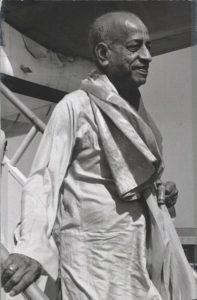
Although it was not yet the right time to venture to western lands, Śrīla Prabhupāda was always seriously contemplating the desire of Śrīla Bhaktisiddhānta Sarasvatī. In 1944 he started a regular English language paper called “Back to Godhead,” which he wrote, edited, financed, printed, and distributed singlehandedly. In 1954, he retired from family life and took up residence in Mathura Vṛndāvana. He formalized his renunciation by accepting the order of sannyāsa in 1959. He began translating Śrīmad-Bhāgavatam in 1960, and was able to get the first three volumes published. In 1965, he began to prepare to come to the United States. His life had been fraught with hardships, and there were more to come as he worked to bring the preaching mission of Śrī Caitanya Mahāprabhu to the western world. He had tried very hard to preach in India, with little support or visible success, and it became evident that the time was coming soon for him to take that determined leap of empowered faith across the Atlantic Ocean.
Śrīla Prabhupāda was eventually granted passage to America on board the Jaladuta, a steamship owned by the Scindia Steamship Lines. The company owner and crew of the Jaladuta had done their best to assure the best comfort possible to their unusual passenger, including making sure that proper vegetarian ingredients were available for cooking. In spite of their efforts, Śrīla Prabhupāda experienced great difficulty on that long ocean journey, including two heart attacks and severe sea sickness. Kṛṣṇa reassured him in a dream that He personally was directing the journey, and when they reached Boston Harbor on September 17th, 1965, the captain expressed that he had never before witnessed the Atlantic Ocean so peaceful. Śrīla Prabhupāda was 69 years old, in a foreign land, in a climate that he sometimes later described as “unbearable,” with no possessions other than the equivalent of about $7 and a trunkful of books and rough typewritten drafts.
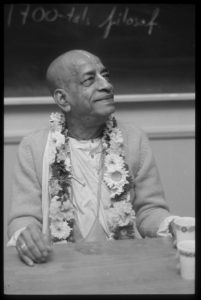
He pondered his situation and why Kṛṣṇa had brought him to this place where the population was addicted to things that were forbidden in a proper Godly culture. He was inspired to write a long poem in a mood of deep prayer.
”My dear Lord Krishna, You are so kind upon this useless soul, but I do not know why You have brought me here. Now You can do whatever You like with me.”
”But I guess You have some business here, otherwise why would You bring me to this terrible place?”
”Most of the population here is covered by the material modes of ignorance and passion. Absorbed in material life, they think themselves very happy and satisfied, and therefore they have no taste for the transcendental message of Vāsudeva. I do not know how they will be able to understand it.”
”But I know Your causeless mercy can make everything possible, because You are the most expert mystic.”
”How will they understand the mellows of devotional service? O Lord, I am simply praying for Your mercy so that I will be able to convince them about Your message.”
”All living entities have become under the control of the illusory energy by Your will, and therefore, if You like, by Your will they can also be released from the clutches of illusion.”
”I wish that You may deliver them. Therefore if You so desire their deliverance, then only will they be able to understand Your message.”
”The words of the Śrīmad-Bhāgavatam are Your incarnation, and if a sober person repeatedly receives them with submissive aural reception, then he will be able to understand Your message.”
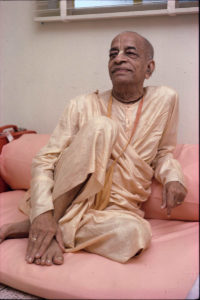
”It is said in the Śrīmad-Bhāgavatam (1.2.17-21): “Śrī Krishna, the Personality of Godhead, who is the Paramātmā [Supersoul] in everyone’s heart and the benefactor of the truthful devotee, cleanses desire for material enjoyment from the heart of the devotee who relishes His messages, which are in themselves virtuous when properly heard and chanted. By regularly hearing the Bhāgavatam and rendering service unto the pure devotee, all that is troublesome to the heart is practically destroyed, and loving service unto the glorious Lord, who is praised with transcendental songs, is established as an irrevocable fact. At the time loving service is established in the heart, the modes of passion [rajas] and ignorance [tamas], and lust and desire [kāma] disappear from the heart. Then the devotee is established in goodness and he becomes happy. Thus established in the mode of goodness, the man rejuvenated by loving service to the Lord gains liberation from material association [mukti] and comes to know scientifically of the Personality of Godhead. Thus the knots of the heart and all misgivings are cut to pieces. The chain of fruitive actions [karma] is terminated when one sees the self as master.””
”He will become liberated from the influence of the modes of ignorance and passion and thus all inauspicious things accumulated in the core of the heart will disappear.”
”How will I make them understand this message of Krishna consciousness? I am very unfortunate, unqualified, and the most fallen. Therefore I am seeking Your benediction so that I can convince them, for I am powerless to do so on my own.”
”Somehow or other, O Lord, You have brought me here to speak about You. Now, my Lord, it is up to You to make me a success or failure as You like.”
”O spiritual master of all the worlds! I can simply repeat Your message, so if You like You can make my power of speaking suitable for their understanding.”
”Only by Your causeless mercy will my words become pure. I am sure that when this transcendental message penetrates their hearts they will certainly feel engladdened and thus become liberated from all unhappy conditions of life.”
”O Lord, I am just like a puppet in Your hands. So if You have brought me here to dance, then make me dance, make me dance. O Lord, make me dance as You like.”
”I have no devotion, nor do I have any knowledge, but I have strong faith in the holy name of Krishna. I have been designated as Bhaktivedanta, and now, if You like, You can fulfill the real purport of Bhaktivedanta.”
”Signed—the most unfortunate, insignificant beggar A.C. Bhaktivedanta Swami”
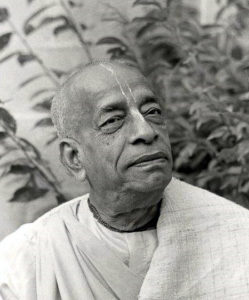
It is described in the Vedic literatures that there are nine processes of devotional service. These are- hearing the glories of the Lord, speaking the glories of the Lord, remembering the Lord and His pastimes, serving the lotus feet of the Lord, deity worship, prayer, serving the Lord’s instructions, serving as the Lord’s friend, and offering oneself in total surrender to the Supreme Personality of Godhead. Śrīla Prabhupāda’s entire life had centered on these principles of devotional service, and now he even more deeply submitted himself as the Lord’s puppet, begging the Godhead to make him dance as He liked, giving himself totally to the will of Sri Kṛṣṇa. Thus, the Lord acts directly through such a surrendered personality for His own purposes. The preaching accomplishments that were made by Śrīla Prabhupāda were therefore not those of an ordinary soul.
The beginnings of Śrīla Prabhupāda’s mission in the west were humble and very challenging. There were even times that he inquired from the steamship lines when the next ship was returning to India. He was originally sponsored by a friend’s son and his wife in Butler, Pennsylvania, Gopāla and Sally Agarwal, and he stayed with them for three weeks, getting a feel for the mood of the new world in which he would be interacting. He then went to New York City, selling some of the books he had brought with him to cover basic maintenance. He rented a small place on West 71st St. in Manhattan, and after some months, his books, tape recorder, typewriter, everything he needed for his preaching and translating work, were stolen. He moved in with one student on the Bowery for a short time, and then was able to procure a store-front and small apartment at 26 Second Avenue, not knowing how the money would be there to support his efforts. He began giving classes, and chanted in Tomkins Square Park. Many young people of the Lower East Side became interested and would come to hear from him and join the chanting.
In July of 1966, he formed the International Society for Krishna Consciousness in New York, establishing himself as the Founder-Āchārya of that organization. What he was offering had become very popular, and gradually, he and his students, inspired by the personal association of His Divine Grace, opened branches throughout the western world. He continued to preach, and traveled around the globe 12 times in the last 12 years of his life, visiting every major country to introduce the science of bhakti-yoga, or devotional service to the Supreme Personality of Godhead, and the chanting of the Hare Kṛṣṇa mahāmantra. He presented lectures to large and small audiences, and wrote thousands of personally instructive letters. He met with world religious leaders and other dignitaries who greatly appreciated him and his unprecedented efforts to spread Kṛṣṇa consciousness and the potential social reform that would naturally follow if these spiritual truths were practically followed and applied.
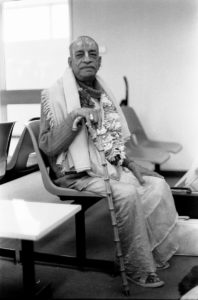
He worked on his translating at night, when it was quiet and there were no external engagements. He usually slept no more than 2 hours out of the 24 hour day. Śrīla Prabhupāda thus translated into English, and provided authorized commentary upon, over 80 volumes of the most sacred Vedic texts. His books have been appreciated by widespread audiences, and been used as textbooks in many major universities. His students gave him great joy by translating these works into all the major, and some of the minor, languages of the world, making these teachings widely available to most cultures.
With great personal difficulty and sacrifice, and the assistance of then novice and uncultured students, the mission of applied spiritual wisdom that His Divine Grace came to the Western World to present grew into an international success. Even in India, the message that our Śrīla Prabhupāda had worked for 40 years to try to present previous to his journey overseas, was finally accepted with enthusiasm as he returned to his homeland, victorious, with some of his western disciples.
His Divine Grace’s mood was always humble. He admitted that his mission had not been easy, and he always gave all credit to his spiritual master and to the Lord Himself, exhibiting the most elevated mood of devotional service. He never took any credit for himself, but acted as a faithful servant of his spiritual predecessors. He presented, without adulteration, the message he received from his spiritual master.
Śrīla Prabhupāda’s mission had spread quickly, as it was based on purity, simplicity, compassion, perfect transmission of timeless wisdom through an authorized lineage of teachers, and proper utilization of assets. There was amazing growth of spiritual book production and distribution over a mere period of ten years. It was an exciting time.
Although he was an erudite scholar and a pure devotee of the Lord, a true carrier of the pure message of the Godhead, Śrīla Prabhupāda lived amongst his students and taught by his example kindness, caring, and tolerance. He brought his neophyte followers along on the path to spiritual realization with careful guidance. He showed fatherly concern for their health and well-being, and was duly strict at the same time, fully in knowledge that proper spiritual practice would solve all the miseries of material existence. He gave completely of his heart, and thus won the hearts of others.
When he left this world November 14th, 1977, in the Holy Land of Vṛndāvana, India, dictating his purports to 10th Canto Śrīmad-Bhāgavatam until the very end, he was still teaching by his example. This time, however, the painful lesson was how to properly exit the material body and return to Kṛṣṇa’s eternal abode. Pangs of grief affected the hearts of his thousands of disciples and followers worldwide at the loss of their best friend and eternal well-wisher. None of us who knew him will ever forget the moment when we heard the devastating news of his departure.
Śrīla Prabhupāda considered the printing and distribution of his books of paramount importance, and also expressed that only 50% of his mission had been accomplished. He had wanted to see the development of sustainable communities in which everyone was happily engaged in the service of Kṛṣṇa with their natural talents and strengths. This would support gradual and steady spiritual progress, without hypocrisy or judgement, for all classes of people, in an atmosphere of natural simplicity. These communities would provide a solid foundation of strength for both the physical body and the entire preaching mission.
That work, he left to us.
